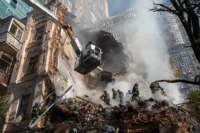
Victory Is Ukraine’s Only True Path to Peace
For Ukraine, December 14 was a tale of two cities. In Brussels, the European Union’s leaders took the historic decision to open talks with Ukraine about joining the organization. For millions of Ukrainians, it was a moment of hope for a brighter future after enduring years of war and hardship. The message was clear: Ukraine belongs at the heart of Europe.
This vision of Ukraine’s future could not have been more different than the one being described by Russian President Vladimir Putin in Moscow on the same day. Responding to pre-screened questions from journalists and handpicked citizens, Putin insisted during a televised press conference that Russia’s political and military aims had not changed since the beginning of the war.… Seguir leyendo »







